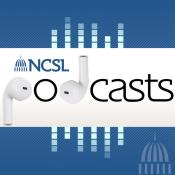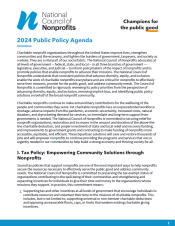Tuesday, Jan. 30 at 3:00 pm Eastern
Access Remaining COVID-Relief Funds Before It Is Too Late
The clock is ticking. Tens of billions of dollars are still available for charitable nonprofits, but only if state and local governments commit to spending those funds on nonprofits (as opposed to elsewhere) by the end of 2024. Otherwise, the federal government may claw back uncommitted funds. The networks of the National Council of Nonprofits are hosting a special, nationwide webinar to make sure charitable nonprofits know they are eligible for these resources and know how to access them before it’s too late.

Joining us will be Treasury Deputy Secretary Wally Adeyemo to kick off the discussion of how nonprofits can access remaining Coronavirus State and Local Fiscal Recovery Funds made possible through the American Rescue Plan Act. He and other speakers will address the availability of these funds, priorities that deserve special attention, and examples of what works. The one-hour event will be held on Tuesday, January 30 at 3:00 pm Eastern.
Spending Showdown Delayed Until March
With just days before funding expires for several federal departments and agencies, congressional leaders over the weekend announced a plan to continue spending for four appropriations bills through March 1, and the remaining eight bills through March 8. The extensions would give appropriators more time to work through the thousands of decisions required to implement the $1.7 trillion spending deal reached by congressional leaders early last week. During this time, lawmakers may also be able to work through a series of controversial policy riders attached to spending bills in the Republican-controlled House. But passage is not certain; Speaker Johnson has faced a firestorm of criticism from the most conservative members of his caucus over both the agreement on spending levels and this new plan to put off final decisions for six or more weeks.
The delay in the Fiscal Year 2024 appropriations process further complicates negotiations over a supplemental spending bill to provide support for Ukraine, Israel, humanitarian relief in Gaza, and Taiwan. Speaker Johnson has promised his House colleagues that any such supplemental spending bill must include immigration and border policy changes strongly opposed by the Biden Administration and Senate Democrats. A rift could occur between House and Senate Republicans because the latter are working to negotiate a resolution of the border crisis that many conservatives in the House have said is unacceptable. In these negotiations as well, the threat of a federal government shutdown looms.
A Tax Bill Emerges. Advocacy Needed to Add a Charitable Giving Incentive.
Today, the chairs of the House and Senate tax committees unveiled a bipartisan package of tax provisions that support families, businesses, and individuals, but that does not yet include restoration of a key charitable giving incentive. The legislation would expand the refundable child tax credit, restore three tax benefits for businesses that had been repealed in the 2017 tax law, remove tax liability for payments to victims of recent natural and manmade disasters, and increase subsidies for affordable housing. The bill currently does not include restoration of the non-itemizer (universal) charitable deduction, a major priority of the nonprofit sector. If enacted, the tax provisions would remain in effect until the end of 2025. As a revenue raiser to cover the costs to the treasury of the other tax breaks, the bill includes revisions to the Employee Retention Tax Credit program, by increasing penalties for abetting ERTC fraud and extending the period that the IRS can bring charges of fraud related to invalid ERTC claims, and shortening by 14 months the employers have to make ERTC claims.
The goal of the tax writers has been to get the measures enacted before the beginning of the tax-filing season on January 29, preferably by attaching it to other legislation moving through Congress. The extension of federal funding bills, discussed above, means that the legislation may have to go to the House and Senate floors as a free-standing bill, a rarity because of the likelihood that Senators will seek to add dozens of additional tax provisions through the amendment process. This approach could help nonprofit advocacy because it provides the opportunity to secure adoption of an amendment to restore the charitable deduction for non-itemizers, that expired at the end of 2021. This can happen, however, only if nonprofits advocate for it.

ACTION ITEM: Representatives and Senators need to hear immediately from the charitable nonprofit community. Call your Representatives and Senators today and tell them: “The [Representative/Senator] must insist on restoration of the non-itemizer (universal) deduction as a provision in any tax package under consideration.” You can also write your Representatives and Senators to deliver the message via email.
Federal FastView
- Targeting Higher Ed Tax Exemptions: In an aggressive letter to four elite universities, House Ways and Means Committee Chair Smith (R-MO) laid out his case for going after the tax-exempt status of higher education institutions that do not provide what he considers an appropriate response and support for Jewish people and students in the aftermath of the Hamas attack on Israeli citizens in October 2023. He wrote that the “universities have long practiced the protection of preferred speech rather than truly protecting all speech,” and asserted that “this alarming approach to protecting free speech while not simultaneously protecting students on campuses comes at a time when diversity, equity, and inclusion (‘DEI’) activity is surging across the country.” He concluded by demanding each of the four universities respond to 13 questions, ranging from seeking free speech policies and educational purposes to endowment investment information and application of DEI programs to Jewish students.
- Employee vs. Independent Contractor: The Labor Department released its long-expected final rule, Employee or Independent Contractor Classification Under the Fair Labor Standards Act, that restores independent contractor law to a “totality of the circumstances” approach. Effective March 11, 2024, the rule will require consideration of six factors to determine whether an individual is an employee – and thus entitled to wage and hour protections – or an independent contractor. A Trump-era modification had made it easier for employers to classify workers as independent contractors by relying primarily on two factors: (1) the nature and degree of the worker’s control over the work, and (2) the worker’s opportunity for profit or loss. The new (restored) rule requires consideration of those two and four more factors, without weighing any one as more important to the final decision. The other four factors are (3) investments by the worker and the potential employer, (4) the degree of permanence of the work relationship, (5) the extent to which the work performed is an integral part of the potential employer’s business, and (6) the worker’s skill and initiative. See Department of Labor FAQs.
- Interesting Priorities in Annual National Taxpayer Advocate Report: The annual report to Congress from the National Taxpayer Advocate is out. Among the nonprofit-related priorities is a call to set a single mileage tax deduction rate for all uses of automobiles (the charitable rate has been stuck at 14 cents/mile for more than 25 years) and a recommendation that Congress eliminate the contemporaneous acknowledgement requirement from nonprofits charities if other evidence is available to demonstrate that a charitable donation was made in a specific year. The Taxpayer Advocate took the IRS to task for delays in processing Employee Retention Tax Credits, yet acknowledges the IRS is between a rock and a hard place in handling ERC claims. “If it pays claims quickly without adequate review, it could pay billions of dollars to nonqualifying persons. If it takes the time to review claims carefully, eligible employers will experience significant delays in receiving the credit, and in extreme cases, employers who need the funds immediately could go out of business.”
- Proposed Rule on Unfair or Deceptive Fees: The Federal Trade Commission (FTC) is proposing new federal rules for heightened transparency in offerings of goods and services that entail fees. The draft rules would require sellers to display the total price of items for sale where sales prices are displayed and advertised, and to accurately represent the nature and purpose of fees that are charged. The proposed rule could affect a wide array of nonprofit activities, including tickets to performances. The public is invited to submit comments by the due date of February 7, 2024 (extended from Jan. 8).
- DAF Rule Comment Period Extended: The Treasury Department announced last week that it has extended the period for public comments on the proposed regulations on Donor Advised Funds to Feb. 15, 2024. The original due date had been Jan. 16. As currently drafted, the proposed rule includes definitions for who or what qualifies as a DAF, donor, and donor-advisor, as well as exceptions to the definition of a donor advised fund. Included in the definition of DAFs would be some giving circles, field of interest funds, and other committee funds. The draft regulations also propose an "anti-abuse rule" meant to deter donors from using DAFs to avoid excise taxes on donations to individuals. The government invites interested parties to submit public comments by February 15, 2024.

Commemorating National Poverty in America Awareness Month
Sixty years ago, the Civil Rights Act of 1964, as well as the Economic Opportunity Act, were signed into law, launching many poverty reduction programs. The Economic Opportunity Act funded the first Community Action Agencies and this month, the National Community Action Partnership (NCAP) launched its 60th anniversary celebration, coinciding with National Poverty in America Awareness Month. From January through 2025, NCAP will host several events and activities, and encourages local CAP agencies to use its toolkit to uplift key messages and resources.
State of the States: Priorities of Interest to Nonprofits
By the end of the month, most governors will have delivered their State of the State addresses, released their budget framework, or both, to advance their agendas for 2024. Their priorities and proposals can impact charitable nonprofits and communities depending on the fiscal outlook of the state. Here are a few highlights from the first weeks of the year.
- Taxes: Governors in Colorado, Georgia, Iowa, and West Virginia expressed support for lowering their state income taxes. In Virginia, Governor Youngkin proposed a tax code reform that includes a 12% across-the-board cut, a 0.9% increase of the sales and use tax, and an expansion of the Commonwealth’s earned income tax credit.
- Child Care: Governor Justice of West Virginia proposed a Child and Dependent Care Tax Credit for families unable to find affordable child care. During his address, Virginia’s Governor said that the Building Blocks for Virginia Families program announced in December would ensure that eligible families can continue to access quality child care.
- Workforce Shortages: Several governors also focused on workforce challenges in their states and offered solutions for recruitment and retention. New York Governor Hochul announced the creation of the Office of Service and Civic Engagement to promote civic and service opportunities. She also proposed expanding loan repayment programs for the state’s youth mental health professionals, as well as removing barriers to hiring “qualified candidates.” In Virginia, a proposal to expand universal licensing would make it “easier for people moving to Virginia to get to work.” South Dakota’s Governor announced her intention to continue the Freedom Works Here workforce recruitment campaign to encourage employees in high-need industries to move to the state. Iowa Governor Reynolds called for the allocation of $96 million to increase teacher starting pay to $50,000 and set a minimum salary of $62,000 for teachers with more than 12 years of experience.
- Natural Disasters: In 2023, there were 28 billion-dollar disasters, making it the worst year on record. Governors from West Virginia and Vermont called for greater flood resiliency and recovery, with Vermont’s Governor adding that this could in turn expand “economic security” in the state. New York’s Governor also proposed more investments in disaster response and repairs for aging infrastructure.
Worth Studying
- State Of The State – 2024, National Governors Association, updated regularly.
- State Policy Trends to Watch in 2024, National Conference of State Legislatures, Jan. 10, 2024.
- Arizona lawmakers face big deficit due mostly to massive tax cut and school voucher expansion, Jacques Billeaud, Associated Press, Jan. 5, 2024.
Trend Spotting
Promoting Child Care Access, Affordability
Two weeks into the New Year, state legislators are demonstrating a commitment to expanding access to affordable child care. Given that a large share of child care providers are nonprofit organizations and that the lack of child care was identified as a major factor causing the nonprofit workforce shortage, the trend is of keen interest to charitable organizations across the country. Policy solutions to overcoming the lack of adequate, quality child care come in many forms.
- Property Tax Exemptions: Newly introduced legislation in Indiana would provide property tax exemptions to child care providers, including nonprofit providers, for property owned and used by an employer to provide child care for the employer’s employees. A Kansas bill would exempt from property tax all residential property used as a day care facility. Lawmakers in Missouri have gone even further and reintroduced a proposed constitutional amendment to authorize a property tax exemption for property used for child care, including property used by a nonprofits.
- Sales Tax Exemptions: Utah legislation calls for exempting from sales and use tax the purchases of material for construction of a new child care facility or expansion of an existing one to accommodate a greater number of children.
- Tax Credits: A bill pending in Wisconsin (A. 660/S. 623) would allow for-profit and nonprofit child care programs to claim a refundable tax credit up to $100,000 for expenses incurred for starting their program. The legislation would also enable an employer to claim a tax credit up to $3,000 per child for the amount paid directly to a child care program on behalf of an employee’s child, plus associated administrative costs.
- Regulations: Indiana legislation would require the Secretary of Family and Social Services to evaluate child care licensing requirements and licensure exemptions and make recommendations to simplify requirements. A property tax exemption bill in Nebraska would also permit child care licensees to obtain a dual license to comply with attendance requirements, limit liability insurance requirements, and provide other bureaucratic relief, including allowing for portability of background checks between child care providers.
Worth Reading
- Child care gaps in rural America threaten to undercut small communities, Jazmin Orozco Rodriguez, KFF Health News, Jan. 2, 2024.
- To tackle poverty, more states will offer bigger child tax credits in 2024, Jennifer Ludden, National Public Radio, Jan. 1, 2024.
Worth Listening
-
A 2024 legislative preview (00:33:11), Tim Storey, CEO of the National Conference of State Legislatures, shared on NCSL’s podcast what to expect in policy and politics in 2024. He noted that most state budgets remain in good shape, and he expects technology, especially artificial intelligence, to be high on the priority list for legislatures. Other key issues will be housing, the workforce and the fentanyl overdose crisis.

-
I Was Told There Would Be Snacks (00:38:06) podcast from Tennessee Nonprofit Network, featuring National Council of Nonprofits President & CEO, Tim Delaney, and United Way of Greater Chattanooga’s Abby Garrison, discussing the challenges and opportunities that the Tennessee Nonprofit Network faces in becoming the first statewide nonprofit association in Tennessee. Also available on Apple Podcasts and Spotify.

Worth Studying
-
2024 Public Policy Agenda, National Council of Nonprofits, Dec. 13, 2023, addressing public policy priorities at the federal, state, and local levels in the executive, legislative, and judicial branches of government. The Agenda explains the philosophies underlying policy positions and identifies specific action items in the areas of taxes, budget and spending, workforce policies, government grants and contracts, nonprofit advocacy rights, and regulatory matters.

Numbers in the News
7.3%
The decline in the number of donors to charitable nonprofits during the third quarter of 2024 compared to the same quarter in 2023.
Source: Donor Retention and Acquisition Key Challenges for Social Sector in Q3 2023, The Fundraising Effectiveness Project, Dec. 21, 2023.
$53 billion
The amount of the $4.6 trillion worth of pandemic federal relief funds that went to arts and entertainment. The funds came from the CARES Act, the American Rescue Plan, the Paycheck Protection Program, and the Shuttered Venue Operators Grants. Ninety-six percent of all counties received some form of arts relief.
Source: Study Illuminates the Breadth of Federal COVID-19 Relief Funding for Arts and Culture, SMU DataArts, Dec. 14, 2023; see also, Pandemic relief funding for the arts was 'staggering', Elizabeth Blair, National Public Radio, Dec. 14, 2023.
Only the Beginning: From Legislative Victories to Real Progress
Sometimes we need to remind ourselves that legislative victories, while important, are only the beginning of the process to make real progress. The enactment of advance payment legislation in California is indeed historic and worth emulating throughout the country. But as advocates there know, legislation alone will not fix the longstanding challenge. Now advocates must turn quickly to implementation, education, and evaluation to ensure the law lives up to and/or exceeds expectations.
Stay in the Loop
Want to be the first to know policy developments and operational trends affecting nonprofits? Sign-up to receive our free newsletters, Nonprofit Champion and Nonprofit Essentials, and browse the archive of past editions.
Sign-Up